
Trade and Industry Secretary Ramon Lopez. (File photo by GRIG C. MONTEGRANDE / Philippine Daily Inquirer)
Several months after it was rolled out, the P10-billion fund earmarked for lending to small businesses has remained largely untapped as many entrepreneurs have been reluctant to borrow for fear of failing to pay back their loans.
Bayanihan to Recover As one Act, which was signed into a law in September 2020, earmarked P10 billion for lending to micro, small and medium enterprises (MSMEs) through the Bayanihan COVID-19 Assistance to Restart Enterprises (CARES) program
Records show, however, that of the total amount, only P3.3 billion in loans had been extended to date.
Trade and Industry Secretary Ramon Lopez said in a television interview on Friday that the situation now called more for a direct subsidy, instead of microfinancing, given the reluctance of small businesses to borrow money.
The loan is currently being administered by Small Business Corp., the financing arm of the Department of Trade and Industry (DTI). In an interview on the ABS-CBN News Channel, Lopez said only P3.3 billion had actually been disbursed.
“That does not mean there is any backlog. We’re the ones promoting it and inviting [MSMEs] to borrow. The take-up was actually lower two months ago. We really had to promote it,” Lopez said.
So far, only 27,000 enterprises had availed themselves of loans under the program. The number is just a drop in the bucket considering that there millions of MSMEs in the country.
Uncertainty
“Our thinking here is the borrowers or the potential borrowers are a bit reluctant as they are worried that they may not be able to repay the loans [as business prospects remain uncertain],” Lopez said.
“So these are the problems here. That’s the reason why we can say it’s not microfinancing that’s needed, but a straightforward subsidy,” Lopez said, as he pushed for the passage of another stimulus package under the Bayanihan 3 bill.
P52B for aid
Under the P420-billion Bayanihan 3 bill proposed by Marikina City Rep. Stella Luz Quimbo and Speaker Lord Allan Velasco, a P52-billion fund will be allotted for subsidies to small business for wages and other work-related expenses.
Last year, Quimbo had proposed a P1.3-trillion stimulus package, which, however, did not gain support from the administration.
Certain quarters believe there is an urgent need for increased spending now as the country is deemed in a worse position than where it was a year ago. INQ